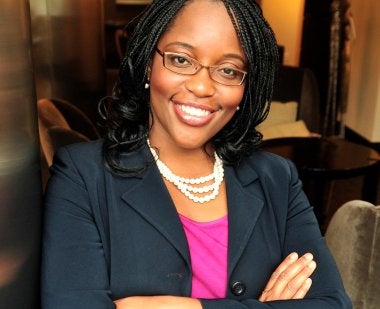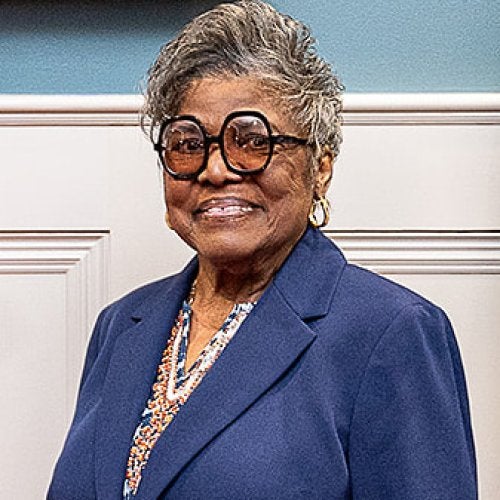
Michelle Asha Cooper on Higher Education Equity and Leadership
University of Maryland alumna Michelle Asha Cooper, Ph.D. ’06, was appointed acting assistant secretary for postsecondary education and deputy assistant secretary for higher education in the Biden-Harris administration in spring 2021.Dr. Cooper completed her doctorate in education policy and leadership and was previously president of the Institute for Higher Education Policy. Her time in the College of Education foreshadowed a career dedicated to improving access to and equity in higher education.
How did your doctoral experience influence your career?
The issues we studied in class at Maryland are directly related to the work I do—issues of college access, affordability, serving underrepresented students, and other equity issues.
I really started to blossom through a U.S. Department of Education (Advisory Committee on Student Financial Assistance) internship opportunity I had while writing my dissertation. My dissertation advisor at Maryland— Dr. Laura Perna—encouraged me to apply for the internship. It wasn’t until I had that internship opportunity that I began to understand the policymaking process—and how through it, my work could potentially benefit millions of students.
What drew you to your dissertation topic, “Dreams Deferred? Exploring the Relationship Between Early and Later Postsecondary Educational Aspirations Among Racial/Ethnic Groups”?
My dissertation was focused on high school students’ educational trajectory, primarily the plans and decisions that influenced their college dreams and choices. The pre-college years are really important. We lose a lot of students before they get in the door of an institution. As students move through high school—and prepare to graduate— what can we do to get more of them into college?
The dissertation study also looked at equity, specifically race and ethnicity. The focus on equity has been a hallmark of my career and one I’m particularly proud of. The title of the dissertation—‘Dreams Deferred’ —was inspired by the Langston Hughes poem with the same name. The inequities of our postsecondary system shows that so many students’ dreams and aspirations get “deferred.” So, to continue the push toward greater equity, we have to ask—what are the systemic policy levers that can influence barriers to college access and graduation? How can we eliminate these things that are deferring our students’ dreams?
What are your goals with your role at the Department of Education?
My commitment to college students and leaders is 100% aligned with President Biden’s commitment to “building back better.” The theme of recovery is essential to the goals of advancing higher education. One of my primary roles is managing the higher education emergency relief funds, which amount to a little more than $75 billion to higher education. Helping colleges help students recover is a key priority.
Other major priorities relate to college affordability, access to college and jobs, and a commitment to equity. This administration is deeply committed to a postsecondary educational system that provides an affordable college education. [Ed. Note: after this interview occurred, President Biden announced a plan to offer free community college tuition as part of the American Families Plan legislation.]
We want to get students into college and out of college, so they can contribute to the workforce and economy. That requires high-quality programs with clear career paths. Internships play a critical role in career preparation. I know the power of internships first-hand. We also have a commitment to address persistent equity problems. I know eradicating sexism, racism, discrimination, and homophobia is not going to happen overnight, but I am part of an administration committed to addressing these problems.
How has the pandemic affected higher education?
Many institutions have experienced declines in enrollment during the pandemic, including at community colleges and among first-generation college students. Some of those colleges have experienced double-digit declines. My hope is that federal funds will help institutions recover and regain what was lost during the pandemic. I hope college leaders can re-enroll and re-engage these students.
How can we address the gender gaps in higher education?
Women are going to college in higher numbers than men, but you have to look at where they’re enrolled. For example, low-income, women of color are overrepresented at for-profit universities. We want to make sure we’re giving women equal footing on all fronts. So, where they attend college is important, as is the quality of that education. Even when you look at jobs, women still lag behind men in pay equity. People will say, “That’s not higher education’s responsibility.” But, it is higher education’s responsibility because we educate future leaders and employers. The University of Maryland and programs like our education track play a really important role in shaping careers and future leaders.
What role does faculty diversity play?
Years ago, I was a research assistant for a book, called “Diversifying the Faculty.” I was enrolled at UMD and working on this project with the Association of American Colleges & Universities. For that research, I heard many reasons why it was hard to diversify faculty. Twenty years later, we’re still hearing those same, unacceptable excuses. We have to do better, whether we are growing the next generation of faculty or employing them.
Do you have anything you’d like to add?
In addition to all the career preparation, I want to recognize the importance of friendships and networks I built in my graduate program at Maryland. I advise students, “Be nice to people in your class, some of them you may work with, and some of them you may work for.” You never know how important the person sitting next to you might be. And since the goal is for all UMD grads to be highly influential people, your classmates will all likely be hot shots!



